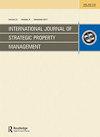Strategic Management Practices and Performance of Non Profit Organizations: A Case of Food for Hungry in Rwanda Nyagatare District
IF 1.7
4区 管理学
Q3 MANAGEMENT
International Journal of Strategic Property Management
Pub Date : 2023-11-09
DOI:10.53819/81018102t2266
引用次数: 0
Abstract
The general objective of the study was to assess strategic management practices and performance of nonprofit organizations in Rwanda and the specific objective of the study was to determine the effect of strategic formulation on performance of nonprofit organizations in Nyagatare district Rwanda, to analyze the effect of strategic implementation on performance of nonprofit organizations in Nyagatare district, Rwanda, to assess effect of strategic control on performance of non-profit organization in Nyagatare District Rwanda. In this study, three theories are used such as Modern Portfolio Theory and Resource Based Theory which have the implication on the current study. To achieve research objectives, the used a descriptive research designs with two mixed methods such as quantitative and qualitative. In this study 75 respondents was selected from the target population of 140 beneficiaries and staffs of FH using the simple random and census method of selecting the sample size. Therefore, simple random sampling technique to select the categories of respondents is used and data collected using questionnaire, interview and documentation. Data collected first be edited, coded and put into tables where analysis are done using SPSS version 21.Thus the strengths of association determined based on regression-values <0.05, mean and standard deviation. Therefore, the overall mean and standard deviation was 1.556 and 0.955 respectively which emphasizes the positive effects of project risks analysis on sustainability of manufacturing industry project in Rwanda. As indicated, the study findings showed that risks monitoring and control has led to the sustainability of manufacturing industry in Rwanda as indicated by the overall mean of 1.485 and standard deviation of 0.813. Effect of strategic management practice on performance of nonprofit organization in Rwanda has been successfully achieved as indicated by the overall mean of 1.485 and standard deviation of 0.813. In this study, R is the correlation coefficient and shows the relationship between the study variables. Therefore, the study findings revealed that there was a strong positive relationship between the study variables as shown by .884. Keywords: Strategic Management Practices, Performance of Non Profit Organizations, Food for Hungry, Nyagatare District, Rwanda非营利组织的战略管理实践与绩效:以卢旺达尼亚加塔雷地区为例
这项研究的总体目标是评估战略管理实践和 该研究的具体目的是确定战略制定对Nyagatare地区非营利组织绩效的影响。卢旺达,分析战略实施对卢旺达尼亚加塔雷地区非营利组织绩效的影响,评估;of 生效;非营利组织绩效的战略控制在卢旺达尼亚加塔雷地区的组织。本研究运用了现代投资组合理论和资源基础理论,这三种理论对当前的研究有一定的启示。为了达到研究目的,采用了定量和定性两种混合方法的描述性研究设计。本研究采用简单随机和人口普查的抽样方法,从140名FH受益人和工作人员的目标人群中抽取75名调查对象。因此,采用简单的随机抽样技术来选择受访者的类别,并采用问卷调查,访谈和文献收集数据。收集的数据首先被编辑、编码并放入表格中,使用SPSS版本21进行分析。因此,根据回归值<0.05、均值和标准差确定关联强度。因此,总体均值和标准差分别为1.556和0.955,强调了项目风险分析对卢旺达制造业项目可持续性的积极影响。研究结果表明,风险监测和控制是促进制造业可持续发展的重要因素。卢旺达工业的总体平均值为1.485,标准差为0.813。战略管理实践对卢旺达非营利组织绩效的影响已经成功实现,总体均值为1.485,标准差为0.813。在本研究中,R为相关系数,表示研究变量之间的关系。因此,研究结果显示,研究变量之间存在很强的正相关关系,如。884所示。关键词:战略管理实践,非营利组织绩效,饥饿食品,Nyagatare地区,卢旺达
本文章由计算机程序翻译,如有差异,请以英文原文为准。
求助全文
约1分钟内获得全文
求助全文
来源期刊
CiteScore
4.00
自引率
18.50%
发文量
23
审稿时长
15 weeks
期刊介绍:
International Journal of Strategic Property Management is a peer-reviewed, interdisciplinary journal which publishes original research papers. The journal provides a forum for discussion and debate relating to all areas of strategic property management. Topics include, but are not limited to, the following: asset management, facilities management, property policy, budgeting and financial controls, enhancing residential property value, marketing and leasing, risk management, real estate valuation and investment, innovations in residential management, housing finance, sustainability and housing development, applications, etc.

 求助内容:
求助内容: 应助结果提醒方式:
应助结果提醒方式:


